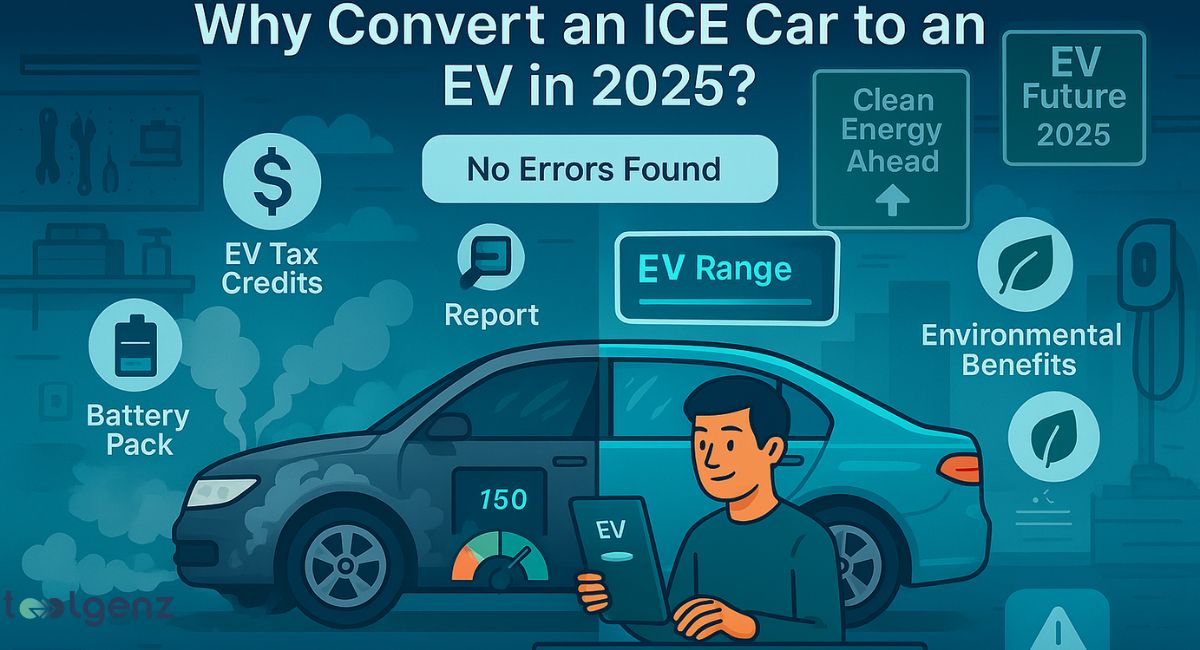In 2025, converting an internal combustion engine (ICE) car to an electric vehicle (EV) is more than just a trend—it’s a smart move toward the future.
With rising gas prices and tighter emission laws, more U.S. drivers are considering converting their gas-powered cars into EVs. This guide explains everything, from the EV conversion cost to available EV tax credit 2025 programs that reduce expenses.
Whether you’re curious about using a battery pack for EV conversion or exploring a classic car EV retrofit, we’ll cover all the must-know steps. It’s time to drive cleaner, save money, and embrace sustainable mobility—without buying a brand-new EV.
Plus, you’ll discover the latest EV performance upgrades, tips on choosing the right electric motor for car conversion, and how EV incentives and rebates can significantly lower your total cost.
By the end, you’ll know exactly how to begin your ICE to EV transformation with confidence.
1. The Push Toward EVs in the United States
The U.S. is pushing hard for clean transportation. Rules are getting stricter for gas vehicles, especially in places like California. States want to reduce emissions and support eco-friendly vehicle conversion.
EVs not only cost less to maintain, but they also help reduce your carbon footprint. Switching now can save you a lot in the long run.
Electricity is cheaper than gas. With EV charging cost comparison, drivers often save hundreds of dollars every year. Plus, new policies offer EV incentives and rebates to help with EV conversion cost.
This shift is also creating more EV conversion shops across the country, offering better service and more affordable options.
The rise of connected cars also aligns with trends in managed telecom services in 2025, supporting better EV infrastructure. The earlier you switch, the more benefits you gain—both financially and environmentally.
2. What’s the Damage? How Much Does it Cost to Convert a Car to Electric?
The cost to convert classic car to electric or any ICE vehicle depends on many things. On average, it ranges from $10,000 to $40,000. The EV labor cost per hour can range from $80 to $150 depending on where you live.
Also, parts like the electric motor for car conversion, battery pack for EV conversion, and EV drivetrain system add to the total price.
Other factors include whether you choose a DIY electric car conversion or hire a professional.
Custom EV builds, the size of the lithium-ion battery for EV, and performance upgrades like regenerative braking or sub-ambient battery cooling can further raise the cost.
Planning ahead and comparing EV conversion companies can help manage your budget.
Here’s a quick look:
| Part / Service | Estimated Cost |
| Electric car conversion kit | $2,000 – $8,000 |
| Lithium-ion battery for EV | $5,000 – $20,000 |
| EV labor cost per hour | $80 – $150 |
| EV charging system | $500 – $2,000 |
| Total (basic build) | $10,000 – $25,000 |
Some choose Tesla battery conversion or Hyperdrive lithium-ion batteries, which cost more but offer better range and power.
3. How to Devour Your Money Wisely: Choosing the Right EV Conversion Path
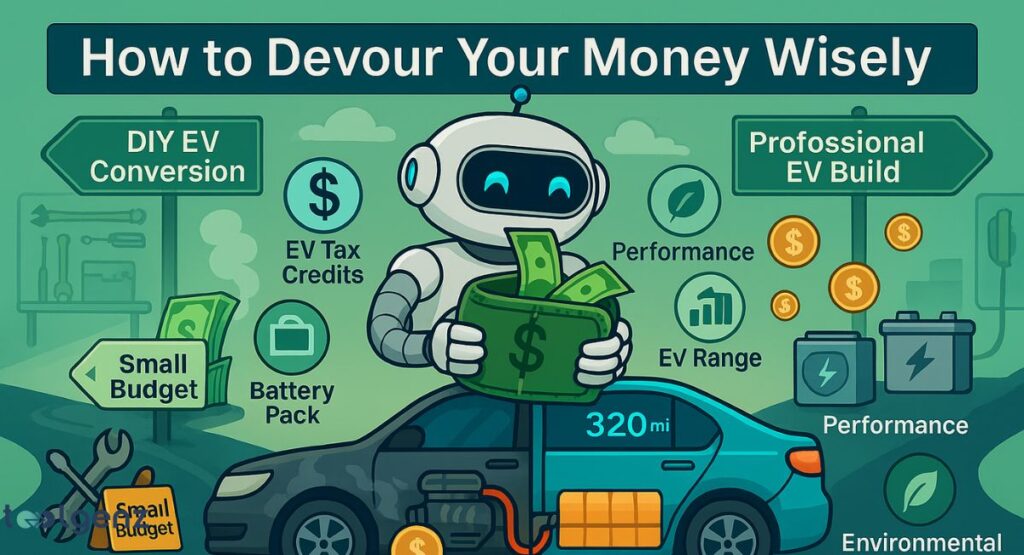
You can either do a DIY electric car conversion or hire professionals. DIY is cheaper but hard. You need to understand parts like Controller Area Network (CAN), regenerative braking, and battery management systems. Professionals help you avoid mistakes and offer warranties.
Think about what you want. Is it speed, range, or saving money? If you want longer drives, pick a 74 kWh battery pack or 100 kWh EV battery price system. If it’s a city car, a smaller EV West conversion kit might do.
Also, consider how much support you’ll need. Some companies offer pre-configured EV systems that save time and lower risk. Always compare your goals with your budget before picking your conversion path.
4. 10 Companies That Will Convert Your ICE-powered Car Into An EV
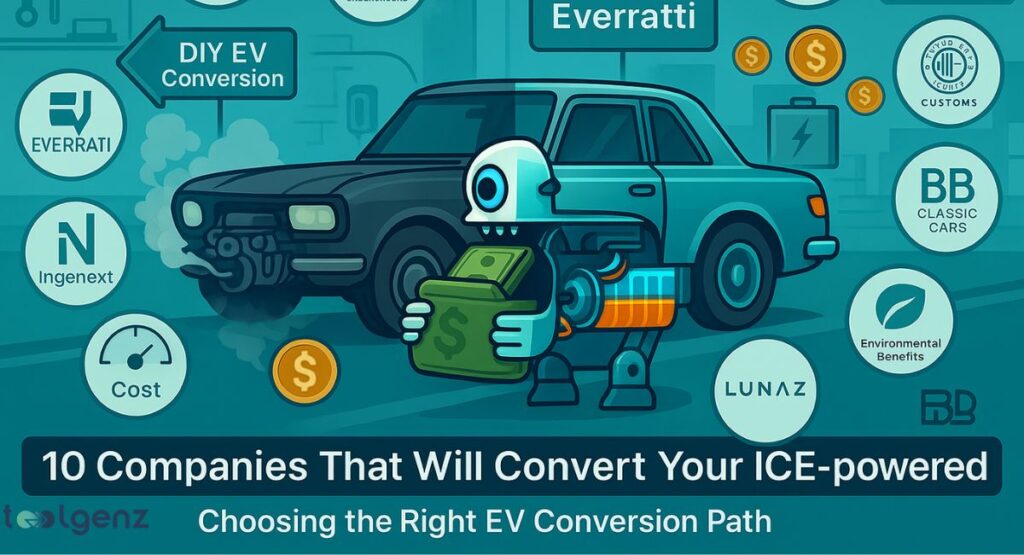
Many EV conversion companies offer services in the U.S. They can turn your old ride into a new electric machine. Let’s look at some top picks.
Each company offers different packages, from custom EV builds to plug-and-play solutions.
Some focus on classic EV upcycling, while others specialize in modern performance upgrades. Choose a company based on your vehicle type, budget, and driving needs for the best results.
4.1 Arc Motor Company
Arc Motor Company focuses on classic cars and custom designs. They offer full ICE to EV transformation services. Great for unique builds.
They use pre-configured EV systems and offer consultation for every project. Their team is known for attention to detail and helping preserve vintage aesthetics while upgrading performance and efficiency.
4.2 EV Underground
EV Underground provides conversions for trucks, sedans, and SUVs. They use EV modular platform systems and custom EV performance upgrades.
Their focus is on power and durability, making them a solid choice for daily drivers or off-road vehicles. They also offer options like sub-ambient battery cooling and CCS fast charging support to boost range and efficiency.
4.3 Ingenext
Ingenext is known for using Chevrolet Bolt battery and Tesla Model 3/Y upgrade components. They support EV conversion shops in Canada and the U.S.
They specialize in advanced integration tools that help manage systems like Controller Area Network (CAN) and regenerative braking. Their kits are ideal for tech-savvy users and offer strong compatibility with modern EV features.
4.4 Everrati
Everrati turns luxury cars into EVs. Popular builds include the Porsche 911 electric conversion and Jaguar E-Type EV. Perfect for collectors.
They focus on classic EV upcycling with premium finishes, offering seamless ICE to EV transformation.
Everrati uses high-quality lithium-ion battery for EV systems and offers full restoration along with EV upgrades, making their service ideal for preserving heritage with modern performance.
4.5 Zelectric
Zelectric loves classic Volkswagens. They also offer classic EV upcycling for vintage cars. Their builds are stylish and green.
They use eco-friendly vehicle conversion techniques and high-efficiency systems for a smooth ride.
With options like regenerative braking and sleek EV drivetrain system setups, Zelectric blends retro charm with electric performance, making them a top choice for fans of timeless design and sustainability.
4.6 Garage Italia Customs
Garage Italia Customs combines design and function. From Alfa Romeo Spider Duetto to modern builds, they use custom EV builds with flair.
Their eye-catching designs combine stylish aesthetics with advanced cooling systems that boost EV performance. and EV modular platform technology.
Their projects showcase how style and sustainability can go hand in hand, offering standout conversions that turn heads and respect the planet.
4.7 Zero Labs Automotive
Zero Labs Automotive focuses on trucks like the Ford Bronco EV. Their EV modular platform gives great flexibility and future upgrades.
They also use advanced components like Hyperdrive lithium-ion batteries and offer features such as regenerative braking and EV drivetrain system enhancements.
Their conversions are built for performance, durability, and style—making them a top choice for off-road enthusiasts who want electric power without sacrificing capability.
4.8 RBW Classic Electric Cars
RBW Classic Electric Cars is a UK company with U.S. reach. They restore classics with new tech. Known for safe, tested builds.
Their process includes using pre-configured EV systems and sub-ambient battery cooling for reliability and safety.
They’re especially popular for vintage car fans looking for an eco-friendly vehicle conversion that blends old-school charm with modern performance.
4.9 Lunaz
Lunaz is famous for top-end builds. Their classic car EV retrofit includes Rolls-Royce and Bentley cars. Very premium but very pricey.
They offer complete ICE to EV transformation with advanced features like regenerative braking and hyperdrive lithium-ion batteries.
Lunaz focuses on preserving luxury while delivering silent, powerful, and environmentally responsible driving experiences.
4.10 BB Classic Cars
BB Classic Cars handles rare and vintage cars. From Zastava 750 conversion to hot rods, they are perfect for rare builds.
They specialize in eco-friendly vehicle conversion while keeping the original look intact. With support for EV conversion consultation and sourcing pre-configured EV systems, BB Classic Cars makes it easier for collectors to embrace electric without losing charm.
5. How to Sum It Up: Is EV Conversion Worth It?
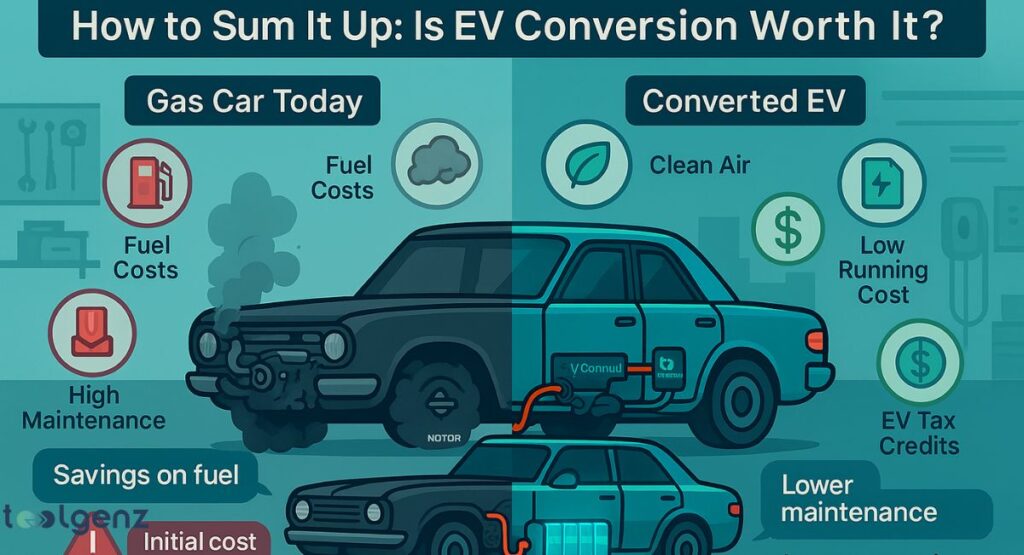
In many cases, yes. A full electric vehicle conversion helps the planet and saves you gas and maintenance costs. It also gives your favorite car new life. But it’s not cheap. Think about your goals. If you love your car or want something unique, go for it.
Think about range. With a 200-mile EV range, you can cover most daily drives. If you’re not driving far, you can even use a pre-configured EV system to save money.
Conversion can be better than buying a new EV, especially with a good EV tax credit 2025 and the Clean Vehicle Rebate Program (CVRP).
Also, some EV conversion companies offer financing and flexible plans, making it easier to afford a project car. Over time, the savings on fuel and repairs can help offset the initial EV conversion cost.
6. Bonus: Tips Before You Commit to an EV Conversion
Always start with an EV conversion consultation. Ask about laws in your state. Some DMV offices require approval. Find out about your EV incentives and rebates before you begin.
Think about the weather. If you live in a hot or cold place, ask about sub-ambient battery cooling. You should also make sure your build supports CCS fast charging.
Check the weight of your car and new parts. Battery weight matters. Go for strong brakes and suspension if needed.
Safety and performance depend on balance and smart design. Many EV conversion shops include detailed plans and engineering checks, which help avoid problems later.
A good plan leads to a better, longer-lasting eco-friendly vehicle conversion. .Especially with a good EV tax credit 2025 and the Clean Vehicle Rebate Program (CVRP)
7. Final Thoughts: Future of EV Conversions and Classic Car Electrification
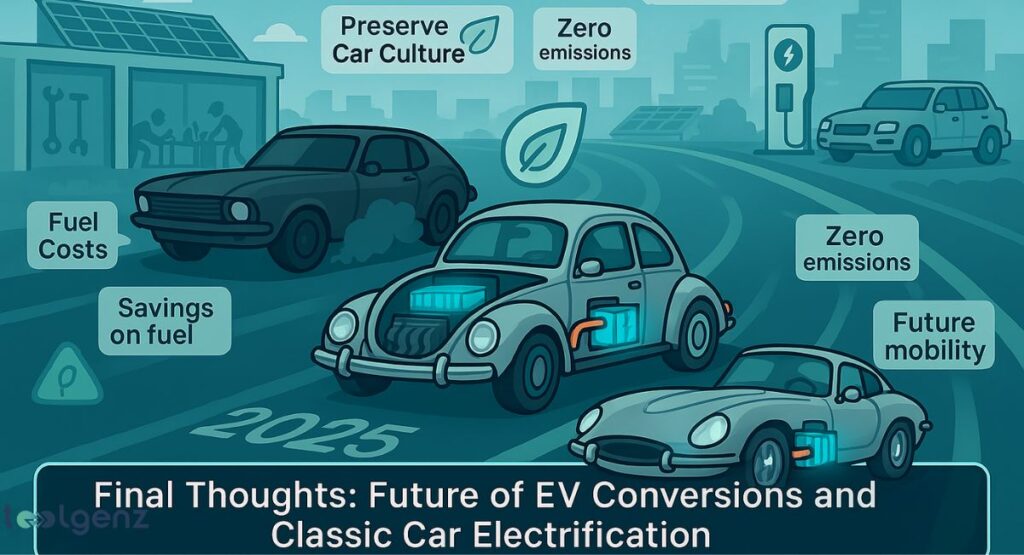
In 2025, converting your gas car to electric is more possible than ever. With companies like Arc Motor Company, EV Underground, and Everrati, you have many options.
Whether you’re using an Ampere EV Atom Drive, a Tesla battery conversion, or a small EV West conversion kit, there’s a path for everyone.
More Americans now want environmentally friendly car conversion. EVs are cleaner, quieter, and cheaper in the long run. Classic EV upcycling is not just a trend—it’s the future of car culture.
So, if you’re still asking why convert an ICE car to an EV in 2025, the answer is simple: it makes sense, for your wallet and the planet.
And as EV infrastructure grows across the U.S., your decision today will only get smarter tomorrow—bringing freedom, performance, and sustainability into one powerful ride.
FAQS
1. What does a converter do in an electric car?
A converter regulates voltage between the battery and electric motor or accessories, ensuring stable power flow.
2. What is the cost to convert a car to electric?
EV conversion typically costs between $10,000 and $40,000, depending on the car, parts, and labor.
3. Do electric cars have converters?
Yes, electric cars use DC-DC converters to manage voltage for different systems like lights and electronics.
4. Can I legally convert my car to electric?
Yes, EV conversions are legal in the U.S., but you must meet state regulations and pass safety inspections.
5. What is the purpose of the electric converter?
It converts high-voltage battery power to lower voltage for vehicle systems and ensures efficient energy use.


